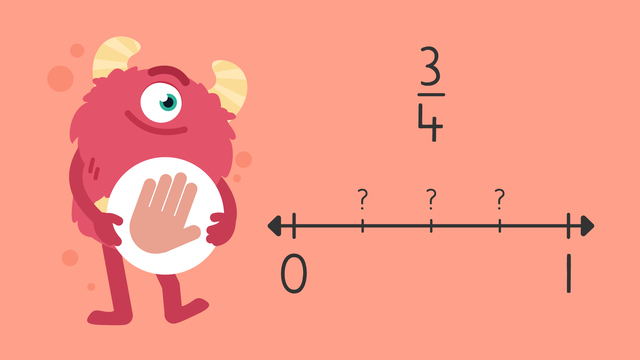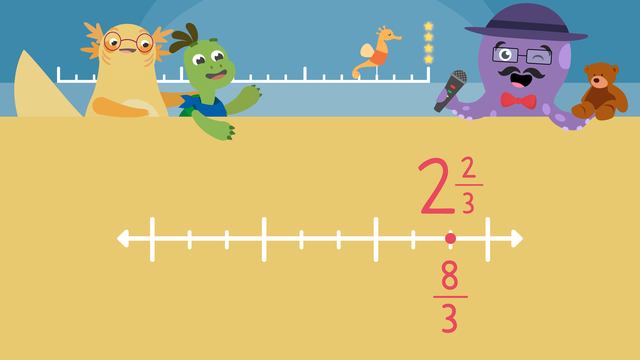Fractions on a Number Line — Let's Practice!


Basics on the topic Fractions on a Number Line — Let's Practice!
Today we are practicing fractions on a number line with Razzi! This video contains examples to help you further practice and grow confident in this topic.
Transcript Fractions on a Number Line — Let's Practice!
Razzi says get these items ready, because today we're going to practice fractions on a number line. It's time to begin! Use the number line to plot one half. Pause the video to work on the problem, and press play when you are ready to see the solution! Divide the number line into two parts matching the denominator, and count forward one part for the numerator. One half goes here! Did you also label one half here? Let's tackle the next problem! Use the number line to plot three fourths. Pause the video to work on the problem, and press play when you are ready to see the solution! Divide the number line into four parts matching the denominator, and count forward three parts for the numerator. Three fourths goes here! Did you also label three fourths here? Let's tackle the final problem! Use the number line to plot three thirds. Pause the video to work on the problem, and press play when you are ready to see the solution! Divide the number line into three parts matching the denominator, and count forward three parts for the numerator. Three thirds goes here! Three thirds is the same as one whole! Did you also label three thirds here? Razzi had so much fun practicing with you today! See you next time!
Fractions on a Number Line — Let's Practice! exercise
-
Where is one half found?
HintsFirst, partition the number line into the number of parts shown by the denominator.
In $\frac{1}{2}$, the denominator is 2, so you should make sure that the number line is split into 2 equal parts.
When the number line is split into 2 equal parts, it looks like this.
Solution$\frac{1}{2}$ would go exactly in the middle from zero to one, half way along.
-
Can you label the number line?
HintsThe fraction line has been partitioned into 4 parts, it is in quarters.
The first blank space is one step on the fraction line. Look for the fraction where there is a 1 in the numerator.
Remember, the top number in the fraction is the numerator and the bottom number in the fraction is the denominator.
SolutionHere you can see $\frac{1}{4}$ and $\frac{3}{4}$ correctly placed on the number line.
-
What fraction is on the number line?
HintsHow many parts has the fraction line been separated into? This is the denominator.
How many steps along the number line have been counted to reach the gap? This is the numerator.
SolutionThe missing fraction on the line is $\frac{3}{4}$.
-
Identify the missing fraction.
HintsHow many parts has the fraction line been separated into? This is the denominator.
How many steps along the number line have been counted to reach the gap? This is the numerator.
Here we would mark on $\frac{4}{7}$ because the fraction line has 7 parts and this point is 4 steps along.
SolutionThe missing fraction on this number line is $\frac{2}{7}$.
There are 7 parts of the number line so this is the denominator. The fraction is 2 jumps along so this is the numerator.
-
Where would each fraction go?
HintsHow many parts has the number line been partitioned into? This is what the denominator is.
To find where each fraction should go, count forwards along the number line by the numerator.
SolutionThis is the correct position of the fractions.
-
What are the missing fractions?
HintsThe numerator is always the top part of a fraction.
The denominator is always the bottom part of a fraction.
When we mark a fraction on a number line, we can find the denominator by seeing how many parts the line is divided into.
We can find the numerator by counting how many jumps to the fraction.
SolutionThe fractions can be seen on the image here.














